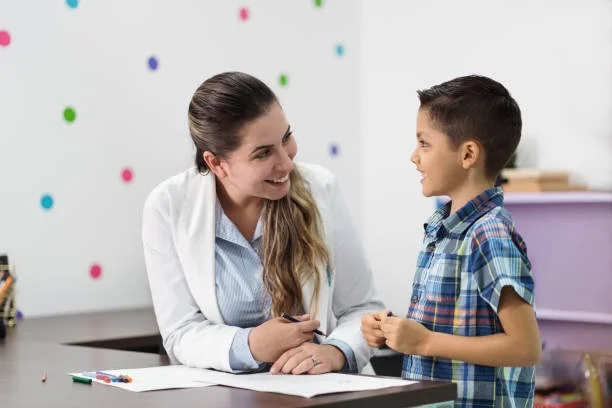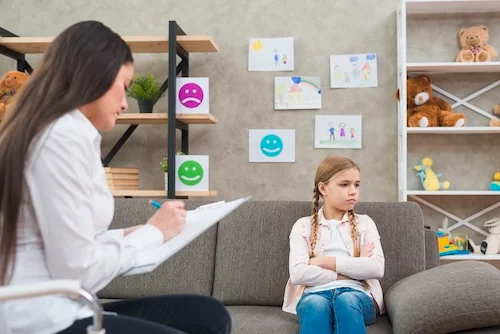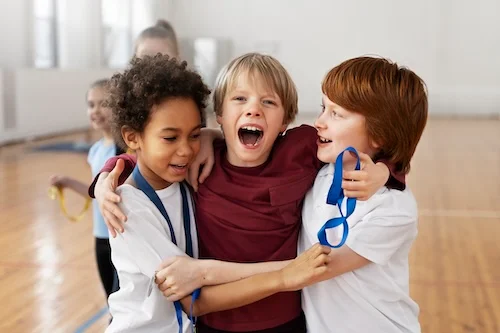Picture two kindergarten classrooms during snack time.
In the first, Emma accidentally knocks over Jake’s juice box.
Jake screams, Emma cries, and the teacher spends the next twenty minutes trying to restore order while other children watch anxiously.
In the second classroom, the same accident happens.
But here, Maya takes a deep breath and says, “I feel frustrated because my juice spilled, but I know it was an accident.” She uses the calming corner the class created together, takes three deep breaths like they practiced, and returns ready to help clean up. The other children continue eating, one even offering to share their juice.
Spot the difference? The second classroom has been learning mental health education since day one.
What happens in these early moments for children and their emotions can create ripples that extend far into their futures.
Yet most schools still treat mental health education as an add-on, something to address only when problems arise. We’re missing a profound opportunity to shape not just academic success, but entire life trajectories.
At AlignUs, our mental health platform recognizes that the seeds of emotional well-being are best planted early.
Through our work supporting communities and educational initiatives, we’ve seen firsthand how early intervention can help individual children thrive and transform communities in some incredible ways. But how?
Early Intervention Creates A Foundation
Something remarkable happens in the human brain between the ages of 3 and 8.
Neural pathways form at an astounding rate, creating the architecture that will support emotional regulation, social skills, and mental health for decades to come. This isn’t just developmental theory – it’s a critical window of opportunity that we’re too often squandering.
The research is staggering in its implications. Schools that implement early mental health education in schools see a 25% reduction in severe mental health issues later in life.
Think about that for a moment. One in four cases of serious mental health challenges can be prevented through early intervention. The same way we inoculate children against physical diseases, we can build immunity against emotional and psychological struggles.
But what makes it really powerful is the compound effect. When a four-year-old learns to identify the feeling of frustration, they’re not just managing a single emotion. They’re developing the neural pathways for emotional recognition.
When they practice taking deep breaths to calm down, they’re building stress response systems. Each skill becomes a foundation for the next, creating an upward spiral of emotional competence.
The Academic Connection
Parents and educators often focus on academic readiness – can children recognize letters, count to ten, and sit still during circle time?
But evidence shows that emotional readiness is equally, if not more, important for school success. Children who enter kindergarten with basic emotional skills are better able to:
- Focus on learning tasks without being derailed by feelings
- Form positive relationships with teachers and peers
- Persist through academic challenges
- Participate fully in classroom activities
The benefits of mental health education in schools extend directly into academic performance. Research consistently shows that comprehensive school mental health programs reduce absenteeism by over 33%. When children feel emotionally safe and capable, they show up – both physically and mentally.
The Neurological Advantage
During these foundation years, the brain is particularly plastic, meaning it can be shaped and molded by experiences. A mental health curriculum that’s age-appropriate takes advantage of this plasticity.
Young children’s brains are literally being wired for resilience or vulnerability based on their early experiences with emotions.
When we teach a five-year-old to recognize anger as a feeling that comes and goes, we’re shaping how their amygdala and prefrontal cortex will communicate for years.
This early wiring affects everything from their ability to handle test anxiety in middle school to managing work stress as adults.
Breaking Cycles Before They Begin
Early mental health education can interrupt intergenerational patterns of mental health challenges. Children who learn healthy emotional skills early are less likely to develop the coping mechanisms that lead to anxiety, depression, or behavioral issues. They’re learning a different language for emotions than perhaps their parents had access to.
Through our mental health platform, we’ve observed how this early intervention creates a protective factor that follows people throughout their development. It’s not that they won’t face challenges – life guarantees they will. But they’ll face them with tools, understanding, and resilience that can make all the difference.
The First Ripple: Emotional Regulation
Mental health education doesn’t wait for children to figure out their feelings through trial and error. It gives them a roadmap.
At age four, this might mean learning that the tight feeling in their chest has a name: worry. By age six, they’re practicing specific strategies to manage that worry before it spirals into panic.
The research backs this up. Students who receive early training in emotional regulation show measurable improvements in their ability to handle stress. They’re learning that emotions aren’t emergencies – they’re information.
Teachers notice it first. Classrooms with a strong mental health curriculum have fewer disruptions. Not because children don’t have big feelings – they do. But they have tools to handle them.
Instead of a student shutting down during math because they’re frustrated, they might:
- Ask for a brain break
- Use positive self-talk they’ve practiced
- Try a calming strategy from their toolkit
- Signal to the teacher they need help
The ripple extends to the whole classroom. When one child models emotional regulation, others learn by watching. Emotional skills are contagious!
Building Stress Resilience Early
Here’s what’s revolutionary about teaching these skills young: we’re actually rewiring how children respond to stress.
The old model waited until children developed anxiety or behavioral problems, then tried to fix them. Mental health education in schools flips this. We’re building stress management systems before chronic stress takes hold.
Children who learn these skills between the ages of 4 and 8 show:
- Lower cortisol levels during challenging tasks
- Better recovery time after upsets
- More adaptive coping strategies
- Less reactive behavior patterns
This isn’t just helping them get through kindergarten without tantrums. It’s setting up their nervous systems for a lifetime of healthier stress responses.
Building Confidence Through Self-Awareness
Self-awareness sounds abstract. For young children, it’s anything but.
It starts with mirror work. “I see brown eyes. I see a big smile. I feel happy today.” Simple observations that build into something profound: the ability to observe yourself without judgment.
Mental health education teaches children to be scientists of their own experience. They learn to notice patterns. “I get grumpy when I’m hungry.” “I feel nervous before music class.” “I’m really good at helping friends feel better.”
This self-knowledge becomes the foundation of confidence. Not the hollow “you’re special” kind. Real confidence is built on understanding your actual strengths and challenges.
The Confidence Cascade
Watch what happens when children develop genuine self-awareness:
First, they start trusting their own experiences. The child who can say “I’m feeling overwhelmed” doesn’t need to act out to be understood. They know what they’re feeling is real and valid.
Next comes self-advocacy. Children who understand their needs can ask for them to be met. “I need a quieter space to focus.” “Can I try a different way?” This is revolutionary for five-year-olds.
Then the magic happens. Children start believing in their ability to handle challenges. Not because someone told them they could, but because they have evidence. They’ve felt angry and calmed down. They’ve been scared and worked through it.
Breaking the Anxiety-Avoidance Cycle
Without early intervention, many children develop a toxic pattern that can follow them into adulthood:
- Feel anxious about something
- Avoid it
- Feel temporary relief
- Anxiety grows bigger
- Avoid more things
Mental health curriculum interrupts this cycle before it starts. Children learn that uncomfortable feelings are temporary. They practice doing hard things with support. They build evidence that they can handle discomfort.
By second grade, children with this training approach challenges differently. Instead of “I can’t do this,” they think, “This is hard, but I have strategies.” That shift changes everything.
Creating Growth Mindsets That Stick
The benefits of mental health education in schools extend beyond managing difficult emotions. Children develop what researchers call a growth mindset, but not through posters and slogans. Through lived experience.
When a six-year-old learns they can change how they feel by changing their breathing, they internalize a powerful truth: they have agency. When they practice getting better at recognizing emotions, they learn that abilities can be developed.
This early self-awareness training creates students who:
- View mistakes as learning opportunities
- Persist through academic challenges
- Seek help as a strength, not weakness
- Bounce back from setbacks faster
Through our mental health platform, we see how this self-awareness becomes self-compassion. Children learn to be kind to themselves when struggling – a skill many adults never master.
The confidence built through early mental health education in schools isn’t fragile. It’s rooted in real self-knowledge and proven capabilities. These children know themselves, trust themselves, and believe in their ability to grow.
That’s a foundation that can support a lifetime of challenges and achievements.
The Social Ripple: Stronger Relationships and Communities
When children can name their own emotions, something beautiful happens. They start recognizing emotions in others.
A kindergartener notices their friend’s slumped shoulders. “Are you feeling sad?” They remember feeling that way yesterday. They offer their favorite calming strategy or simply sit close.
Amazingly, no adult prompted this. The child’s emotional education activated naturally.
Mental health education in schools creates a shared language. Instead of “He’s mean!” children say, “I think he’s frustrated.” Instead of “She’s weird,” they recognize “She might be feeling anxious.” This shift from judgment to understanding revolutionizes classroom dynamics.
The data supports what teachers observe daily. Schools with comprehensive social emotional learning programs report:
- Fewer aggressive incidents between students
- Increased prosocial behaviors like sharing and helping
- More inclusive play patterns
- Stronger classroom communities
Building Empathy Through Experience
Traditional empathy lessons often fall flat. Telling children to “think about how others feel” assumes they know how feelings work. Mental health curriculum builds empathy from the inside out.
This experiential empathy is different. It’s not performed for adult approval. It’s authentic understanding born from shared human experience.
Watch young children try to resolve conflicts without emotional skills. It’s usually tears, telling the teacher, or giving up. Now watch children with mental health education navigate the same situation.
“I feel mad because you took my spot.” “I didn’t know it was your spot. I feel confused.” “Can we find a solution?”
They’re using scripts at first. But with practice, it becomes natural. These children aren’t conflict-free. They’re conflict-capable.
The ripple extends beyond individual classrooms. Schools implementing comprehensive mental health education report culture shifts. Older students mentor younger ones in emotional skills. Playground monitors need fewer interventions. The whole building feels different.
The Long Game: Tracking Success Into Adulthood
The Carolina Abecedarian Project followed children for over 30 years. What they found should reshape how we think about early education.
Children who received high-quality early intervention, including emotional and social support, didn’t just do better in elementary school. By their mid-30s, they had:
- Lower rates of heart disease
- Reduced obesity and diabetes
- Fewer symptoms of depression
- Higher employment rates
- More stable relationships
Follow those kindergarteners who learned emotional regulation into their teen years. While their peers struggle with the emotional intensity of adolescence, these students have advantages:
They’ve been practicing emotional awareness for a decade. When hormones surge and social pressures mount, they have tools. They recognize anxiety and know it will pass. They’ve experienced working through difficult feelings before.
Breaking Generational Patterns
Early intervention interrupts cycles. The child who learns healthy emotional expression won’t pass on patterns of suppression or explosion to their children. The student who develops strong relationship skills builds healthier partnerships as an adult.
Mental health curriculum creates ripples that extend through generations. These children become parents who:
- Recognize and validate their children’s emotions
- Model healthy coping strategies
- Seek help without shame when needed
- Prioritize mental health as part of overall health
Employers consistently rank emotional intelligence as a top desired skill. Those children who learned to collaborate in kindergarten become adults who excel in team environments. The students who practiced self-advocacy become professionals who communicate needs effectively.
Through our mental health platform, we see adults recognizing how their early emotional education shaped their success. They credit those early lessons with their ability to:
- Navigate workplace relationships
- Handle professional stress
- Lead with empathy
- Maintain work-life balance
The economic implications are staggering. Reduced healthcare costs. Higher productivity. Stronger communities. All tracking back to those early years of mental health education.
Creating the Ripple Effect in Your Community
The evidence is overwhelming. The science is clear. Early mental health education transforms lives. So why isn’t it happening in every classroom?
The answer is simple: We’re still treating mental health like an emergency response instead of prevention.
But here’s the hope. Change doesn’t require federal mandates or massive budgets. It starts with understanding what’s possible. It grows through communities deciding that their children deserve better. It spreads one classroom, one school, one district at a time.
At AlignUs, our mental health platform exists because we believe in prevention over crisis management. We’ve seen how communities transform when they prioritize emotional wellness from the start.
Every year we delay means another cohort of children missing this critical window. But every day we start creates possibilities. Every child who learns these skills becomes a ripple-maker. Every classroom that implements mental health education becomes a model.
Your Role in the Ripple
The children in those two kindergarten classrooms from our opening? They’re not just managing juice spills better. They’re building brains wired for resilience. They’re creating futures with less anxiety, depression, and isolation.
The benefits of mental health education in schools aren’t theoretical. They’re real children living better lives. They’re teenagers navigating challenges with confidence. They’re adults building healthier families and communities.
Through our work at AlignUs, we’re committed to supporting this transformation. Our mental health platform provides resources, connections, and hope for communities ready to create change. Because we know that when we invest in children’s emotional wellness early, the ripples extend farther than we can imagine.
Don’t wait for someone else to start the ripple. Be the stone that creates the first wave. Your community’s children – and their children, and theirs – are counting on it.




